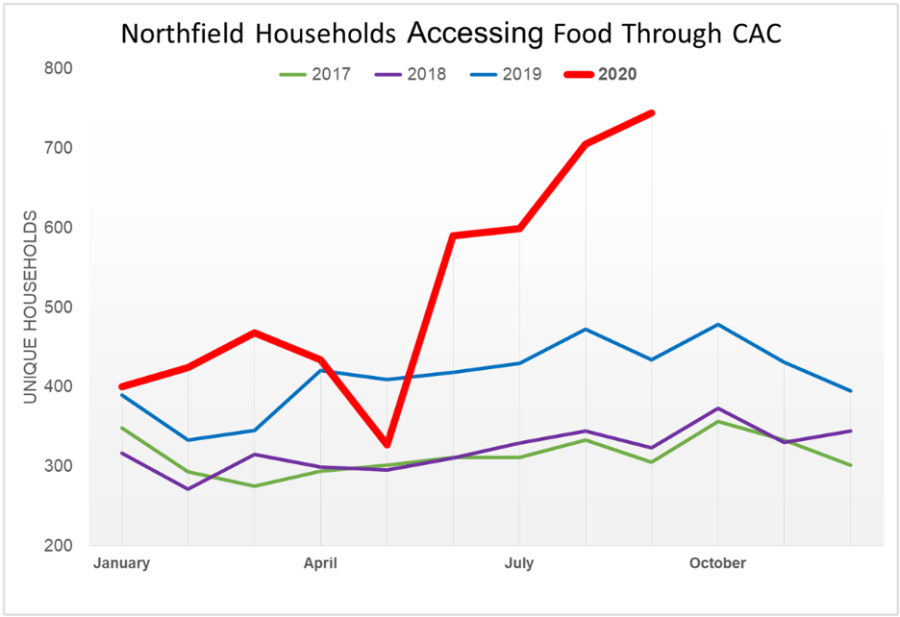On hold since the start of Winter Term, dining hall recovery can now resume with the help of faculty and staff who will take over delivering rescued food to community partners. The adjustment allows Food Recovery Network (FRN) to continue as COVID -19 measures restrict off-campus volunteering.
“We already have a really nice, robust list of faculty and staff who volunteer with Food Recovery Network,” said Erica Zweifel, Assistant Director of Community Engagement at the Center for Community and Civic Engagement (CCCE).
In addition to recovering from campus dining halls, Carleton FRN typically recovers twice a week from retail partners like Cub Foods and Target. Over winter and spring break faculty and staff volunteers step in to handle this recovery and ensure a “seamless impact to our community partner.”
When students left abruptly last spring, Zweifel sent out a call to faculty and staff, which doubled her volunteer list. She hopes to turn to her list this term to recruit volunteers for dining hall food recovery.
The remaining component of the Carleton FRN chapter’s work—helping to distribute food at community partners—occurred outdoors in the fall but will remain on hold for this term.
Carleton FRN’s ability to continue recovery makes it among the minority of FRN chapters. “At the national scale only about 25 percent of our chapters are still able to recover food,” said Cassie Olovsson, Manager of Stakeholder Engagement at FRN. “At the same time, food insecurity rates are skyrocketing as a result of the pandemic,” she added.
“One thing unique about Carleton’s situation is we have a really strong relationship with the Community Action Center,” said Jaren Yambing ’22, one of FRN’s nine program directors. The Community Action Center of Northfield is a nonprofit serving local residents in need, including through operating a food shelf. This year, they have seen an extraordinary increase in need, with over 700 households accessing food in September.
The unusual circumstances of this year have caused FRN to reflect and “explore reciprocal relationships and what that means during the pandemic,” said program director Christof Zweifel ’21, “We get a lot of benefit through community engagement as students.”
While remote, FRN program directors worked on grant proposals to support community partners. “I had the privilege of helping with our request for a new food shelf in Faribault,” said program director Adam Ross ’22. Last year, grants to establish a satellite Food Shelf in Northfield and purchase additional fridges were both secured with the help of FRN.
FRN is currently drafting a proposal to start a free farmers market this summer at the Greenfield Food Shelf in Northfield. Program directors are researching pricing models and gauging which types of produce to supply.
“We want to ask the farmers to grow things that the families who are using the Food Shelf really want,” said Erica Zweifel. “This all has to happen in the next four weeks because the farmers are deciding what to grow.”
With dining hall recovery now approved, FRN program directors are coordinating with Bon Appetit, volunteers and community partners to determine how much food to recover and how to package it. They hope to relaunch the program this week. “We’re in the process of figuring out dates and stuff. The magic happens when you get all of these things to line up, dining hall volunteers and delivery,” said Yambing.
The approval is contingent on caseloads remaining low. “Thank you [to] the students and the Carleton community for taking COVID seriously. That is what allows us to do the dining hall recovery,” said Erica Zweifel.












